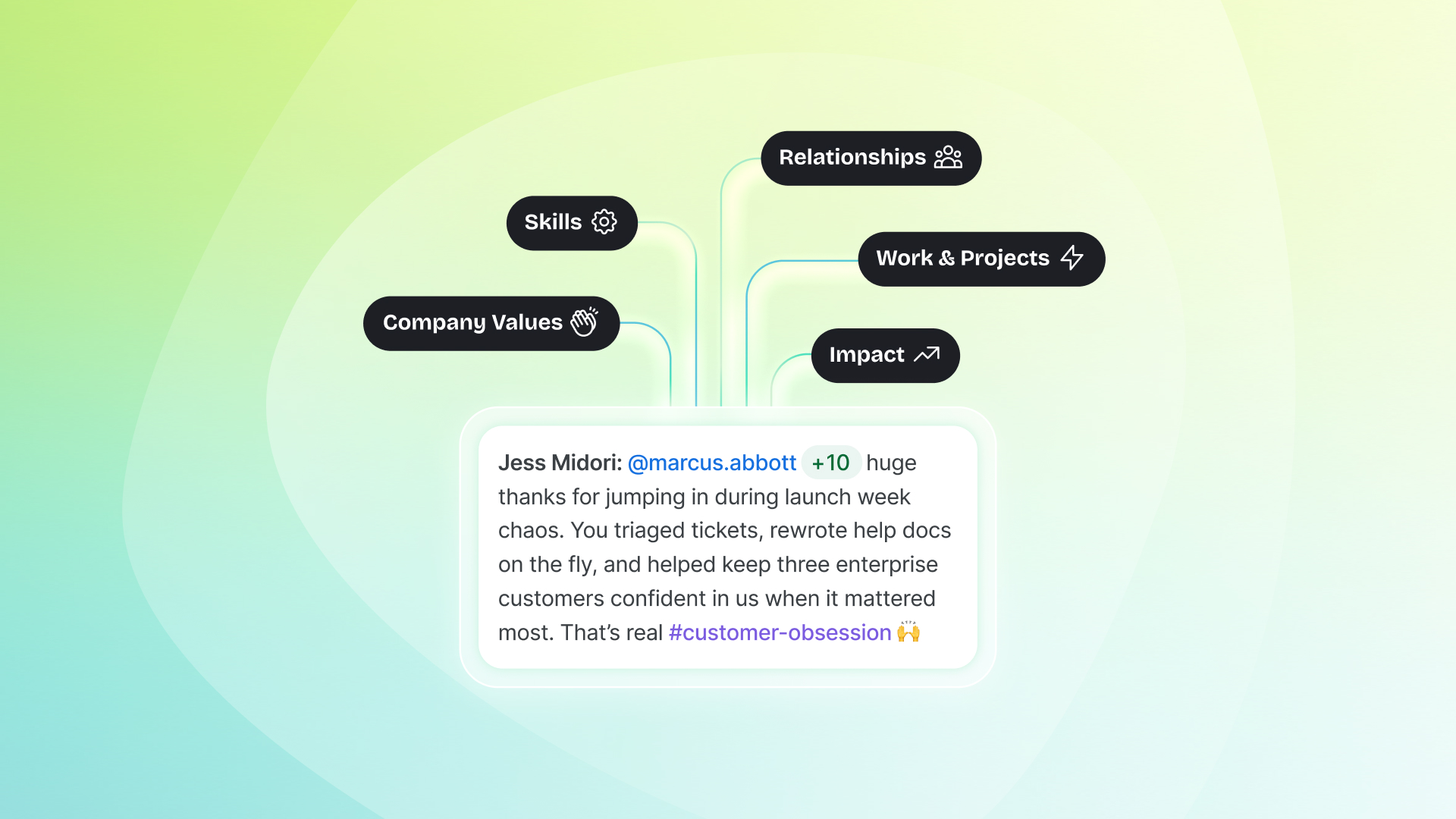How to Receive Employee Feedback

“Hey, can I give you some quick feedback?” Nothing strikes fear into the heart quite like that phrase, no matter who it comes from—a trusted colleague or mentor, a direct report, or a senior leader. We’ve all heard the phrase about feedback being a gift too many times to count, but the truth is, sometimes that gift can feel like getting a pile of old worn-out socks all wrapped up.
Almost all of us still have some very real hangups and anxieties about receiving feedback, even though we value and yearn for it (and want it more than once per year to keep us motivated, engaged, accountable). So while those fears are normal and natural, they also may be holding us back from becoming the best version of ourselves.
Fortunately, you don’t have to simply sit back and hope that the people around you give you the regular, helpful, and thoughtful feedback you crave—you can develop better ways to receive and act on feedback. Here’s your complete guide to receiving feedback like a pro.
--> See how Mindbody uses Bonusly to empower managers and cultivate high-performing teams

Receiving feedback is hard
First, let’s acknowledge just how hard it is to receive feedback, particularly constructive feedback, even when we know that we need it. It’s difficult to hear that you’re doing something wrong, or could use improvement, and that’s only heightened when our career and livelihood depend on us being good at it.
It’s critical to push through that very natural discomfort because feedback is the best way to grow as an employee, manager, leader, and person. If you never truly know how you’re doing in your role because those around you don’t feel they can be honest with you, you’re creating blind spots that prevent you from reaching your career goals.
This is true at any level, but it becomes especially essential to proactively receive and act on feedback as you climb the career ladder. People who wouldn’t hesitate to give constructive criticism to an individual contributor understandably get less eager to do that to a manager, and even less to a leader.
To go back to the feedback as a gift metaphor, if you sulked, shouted, or got defensive every time someone gave you a present, you’d soon stop receiving them. But if you learn how to gather, accept, and act on feedback with acceptance and gratitude, you’ll also gain access to new levels of self-awareness and success.
How to get better at receiving feedback
Give yourself grace
The first step in learning how to receive feedback better is to give yourself some grace. This is a hard process, and almost everyone on the planet has struggled with receiving feedback gracefully at some point in their lives.
Acknowledging your fears around feedback and potential triggers can help you deal with the natural emotions that arise when hearing something negative or critical, even when it’s done tactfully and helpfully. (And it’s especially hard when it’s delivered poorly, which can happen too even with the best intentions.)
For example, if you’re very proud of your writing skills, having someone critique a document you worked hard on crafting can feel like a personal attack (hi, it’s me and every writer I know!). Accepting that emotions will arise as you start seeking out more feedback can help you understand them and process them so you can focus on what matters: making the improvements that will help you get to where you want to go, at work and in life.

Enlist your work community
Feedback is not a passive process—it’s a two-way street and an ongoing conversation. That means you don’t need to rely only on yourself to get better at receiving it: you can ask your work community to help you.
A good first step is talking to your manager about how they think you react to feedback now, since they’re likely the one to give it most frequently, and discuss together how you’d like to improve. You can also ask them to give you feedback more frequently if you’re currently only getting an annual performance review, and even ask them to give you feedback on how you accept feedback (very meta!). Plus, by opening this conversation you can also let them know how you like to receive feedback so your conversations are more productive.
Once those conversations with your manager feel more comfortable, start asking trusted peers and team members to give you feedback too. You’ll get a more well-rounded perspective on what you’re doing well and what needs improvement and might uncover some areas you hadn’t considered before.
It can be intimidating to be asked for feedback by a peer or manager, so people might default to generalities or vague answers (or just say, “Everything’s fine!”). To help get that juicy and specific feedback you can act on, you might need to ask for examples of the behaviors they’re talking about or ask about specific areas where you know you need to improve or want to excel.
Try not to do too much prompting, as it can get in the way of discovering those unknowns you need to know about. Avoid interrupting the feedback-giver with your point of view—-this isn’t a time to argue or defend yourself. And thank everyone who gives you feedback genuinely, even if you don’t agree with the feedback. Gratitude ensures they’ll feel open to doing it again in the future.

Make changes and keep evolving
The hardest part of feedback might be receiving it, but the most important part is next: acting on it to make real changes. This is true at an organizational level, and also at a personal one. All of those people in your work community took time out of their days to offer you feedback (which can be a tough task just like receiving it), and you need to honor that gift by taking action.
Plus, by asking for and then promptly taking action on feedback from the people around you, you show them that you’re flexible, adaptable, and that you value their thoughts and opinions enough to make real changes. You’re a person who can look objectively at yourself and make changes without fear because you’re looking to be the best version of yourself; that’s a pretty inspiring person to be around, as an employee and as a leader.
Once you’ve started this process of asking for and acting on feedback, keep it going! Continue to tell the people around you regularly that you’re open for feedback so they know it wasn’t a one-time offer. And now that you know how powerful receiving feedback can be, don’t forget to offer positive feedback to the people around you regularly (and offer constructive criticism when it’s warranted and they’re open to it).
Receiving all of this feedback has likely made you better at delivering it: you know what kind of feedback is helpful and motivating, and what just makes you feel like a failure. Use this new feedback superpower for good, and you might do more than just change yourself—you could change your whole organization.

Takeaways
Feedback is most definitely a gift, and it’s something we know we need and crave more of. But it doesn’t come all wrapped up nicely in pretty paper and a bow—it can bring some baggage, emotions, and fear along with it. With some time, practice, and self-compassion, however, you can get better at asking for and receiving feedback.
The benefits this practice will bring you go beyond getting a promotion or a raise—they might just help you lead a better, more self-aware life too. That’s worth all of the effort, emotions, and struggles this process might bring up.







